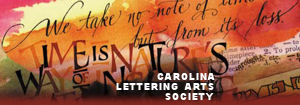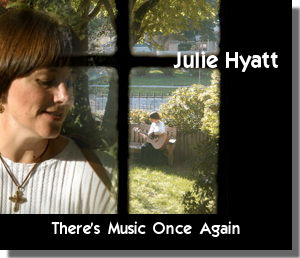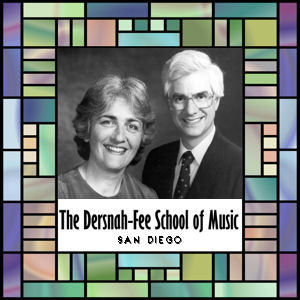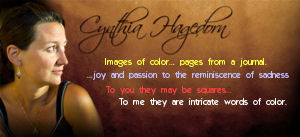| |
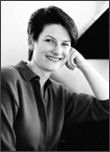 Piano Literature Recordings, 6 volumes. Diane Hidy, pianist. Academy Records.
Piano Literature Recordings, 6 volumes. Diane Hidy, pianist. Academy Records.
It doesn't matter whether you are a piano teacher, piano student, or used to be either, this series of recordings is a delight and a welcome addition to the catalog.
Academy Records founder Keith Snell's vision is to make recordings of the standard student piano literature to give students a referent for how the works should sound. These sterling compact discs do that, as well as provide us former students a wonderful memory of the pieces we used to play.
Without Diane Hidy, an extraordinary concert pianist and renowed pedagogue, this project could easily have fallen prey to cute, overly sentimental, pretentious, or stuffy performances which students would have spotted and snubbed right away. Hidy's readings are the sort that could only have come from a cosummate artist, able at once to understand and interpret the simplicity of these works, while infusing them with dignity and elegance.
Students and their teachers will have much to talk about as they listen to Hidy's readings, which, while they stay strictly confined to the printed scores, nevertheless convey volumes about individual interpretations and stylistic technique. For example, anything marked dolce or adagio (the Adagio from Clementi's third sonatina comes to mind), Hidy elevates to poetic heights while preserving the simplicity inherent in the writing.
The recorded sound on these discs is clean, close, and very present, allowing Hidy's precision-tuned playing to be heard to best effect. Because of the groupings of works, the timings vary considerably, from 26 to 48 minutes per CD, but the trend in the later discs seems to be to include more works on each.
The first volumes in this on-going series feature Bach (18 Little Preludes, the Two-Part Inventions, and excerpts from the Anna Magdalena Notebook), Burgmuller (the Op. 100 Easy and Progressive Studies), Kabalevsky (the Op. 27 and 39 collections) and a disc of more advanced 20th-century literature (Turina, Pinto, Bartok, Copland, and Khachaturian). Coming this fall are collections of Schumann (Album For the Young) and Beethoven. [Spectator Magazine, June 2, 1994]
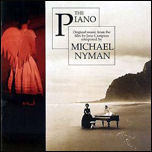 Nyman: Soundtrack to The Piano. Michael Nyman, pianist and conductor. Munich Philharmonic Orchestra. Virgin Records.
Nyman: Soundtrack to The Piano. Michael Nyman, pianist and conductor. Munich Philharmonic Orchestra. Virgin Records.
Jane Campion's extraordinary film The Piano was indebted in large part to composer Michael Nyman's superlative musical score, and the soundtrack album captures the brooding and passionate essence of both.
The solo piano works, writen prior to the filming and affectingly played by Nyman, have an urgency and passion that is compelling for those who have not seen the film, and powerfully emotional to those who have. Since the film's heroine, Ada, is from Scotland, most of her music is drawn from 18th- and 19th-century Scottish popular songs, including the haunting theme hears repeatedly at this year's Oscars, "Bonny winter's noo awa."
As with most film scores, Nyman's evocative orchestral selections were composed after the film's completion and have a richness and complexity that will stand the test of repeated listenings. The 19 tracks form a loosely adhered suite which could conceivably stand by itself as one entire work. And since none of the movements is more than six minutes long, the instrumental colors shift briskly and convincingly.
This is an alive and very bright recording of a remarkable score. It's exclusion from the Academy Award nominations defies understanding. [Spectator Magazine, June 2, 1994]
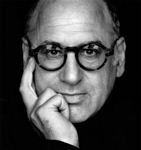 Nyman: The Piano Concerto. Kathryn Stott, pianist. Royal Liverpool Philharmonic Orchestra, Michael Nyman, conductor. Argo Records.
Nyman: The Piano Concerto. Kathryn Stott, pianist. Royal Liverpool Philharmonic Orchestra, Michael Nyman, conductor. Argo Records.
It did not take long for Michael Nyman to receive a commission from the Festival de Lille to compose a piano concerto based on the music from The Piano [see above review]. The result was The Piano Concerto (Nyman insists the definite article is significant), which was premiered in concert and now on disc by pianist Kathryn Stott.
The piano is much more integrated into the orchestral fabric in the concerto than in the film score, and the effect is a broad, sweeping landscape not confined to the limitations of the silver screen. Nyman's writing here is on a symphonic scale, producing a larger, far more complex work than in the original soundtrack, while maintaining the original's romance and accessibility.
The recorded sound is far more ambient and "farther away" than the film soundtrack, perhaps losing some of the urgency and muddling the chance to hear individual orchestral colors. On the whole, the concerto explores more depths and covers more ground, but the film soundtrack's immediacy and presence perhaps edge it out as the favorite. [Spectator Magazine, June 2, 1994]
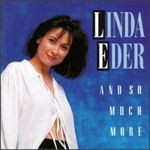 Linda Eder, And So Much More (Songs of Wildhorn, Arlen, Bricusse, Chaplin, Cahn & Simon). Angel.
Linda Eder, And So Much More (Songs of Wildhorn, Arlen, Bricusse, Chaplin, Cahn & Simon). Angel.
This is what can happen when all the elements of an album project come together perfectly: a near-flawless record that arrests and mind and the heart.
The centerpiece of this project is, of course, singer Linda Eder, and nothing can take away from her wonderfully seductive voice and her wide stylistic range that can traverse from Cole Porterish whimsy to Harold Arlen torch and despair in a single bound. But deprive her of all of the other pieces of the recording puzzle which fell together so well in this project, and the result would not be as great, as was witnessed by her first album on RCA.
the other anchor of this album-- and of the other three discs on which Eder has appeared-- is the song writing of Frank Wildhorn, musical voice behind the shows Jekyll & Hyde and The Scarlet Pimpernel. On this disc he and Eder have collected eight of his songs, all tailored and arranged to showcase her vocal talents perfectly.
From the witty Porterisms of "'Til You Come Back To Me" and the paean to love in the '90s "Is This Any Way To Fall In Love" ("You woo me with faxes, I shelter your taxes, but is this any way to fall in love?"), to the seductive "Someone" featuring a duet with Eder and Michael Feinstein, Wildhorn's songs are presented as well here as they're ever likely to be.
Unlike on her first album, Eder also includes the songs of other composers, and they provide a wonderful counterpoint. Included are an exquisite arrangement of Charlie chaplin's "Smile," plus Paul Simon's "Bridge Over Troubled Waters," "The Man That Got Away" by the great Harold Arlen, "When I Look In Your Eyes" from Dr. Doolittle, and a yearning rendition of Sammy Cahn's "All The Way."
Eder is miked quite close, givng an immediacy that is striking, and the engineers have added a rich revergb as well, and the warmth and depth it gives is most appealing. The arrangements by pianist Jeremy Roberts are haunting and spacious, and the big band and strings that Kim Scharnberg and Claude Gaudette add in their arrangements maintain a simplicity that never interferes with the music or Eder's artistry.
Eder suggests in the liner notes that the listener "Play it on some cool dark night and enjoy." It is excellent advice, although the magic of this disc will be felt in almost any setting. [Spectator Magazine, September 29, 1994]
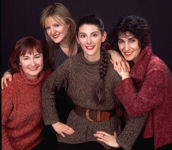 Love's Illusion: Music from the Montpellier Codex. Anonymous 4. Harmonia Mundi.
Love's Illusion: Music from the Montpellier Codex. Anonymous 4. Harmonia Mundi.
This extraordinary vocal quartet, who have named themselves Anonymous 4, after the appellation given to an unknown 13th-century musicologist, continue to astonish the world of recorded music.
Their first release, An English Ladymass, a Marian program of 13th- and 14th-century chant and aplyphony as might have been celebrated in Salisbury Cathedral, rose to number 3 on Billboard magazine's Classical Albums chart, a feat unheard of for such obscure repertoire. It achieved near-cult status, in much the same way that the Spanish Gregorian Chant disc and the Gorecki Third Symphony sis, selling to Medievalists and New Agers alike.
Their second disc, a collection of Christmas motets and carols from roughly the same period, climbed up the Billboard charts as well, and it is now clear that the artistry of these four women transcends the fassishness of the chant cult. Love's Illusion, their third and newest release, is a collection of 29 French motets from the musically rich and historically invaluable Montpellier Codex, and the fans that Anonymous 4 have garnered along the way will be thrilled.
This disc doesn't have the programmatic structure of Ladymass nor, by definition, the variety offered by the Christmas album, but in each of these gems, averaging about two minutes each, the quartet seamlessly interweaves the vocal polyphony into a shimmering, harmonically rich silken cloth.
The exquisite, carefully tuned vocal blending of these remarkably similar voices provides an insight into, as well as a transforming aural sense out from, these works that is spellbinding. That the various lines, each a setting of differing texts, are sung by voices in roughly the same range (as intended) demonstrates the organic whole of the motets far better than can voices ranging from the typical soprano to bass.
Adding to their celestial sound is a warm, rich, cathedral-like acoustic, whic was not produced in their home of New York's St. Michael's Church but in LucasArts' Skywalker Sound Studios. Middle Ages do indeed meet New Age here, and the result is nothing short of sublime. [Spectator Magazine, September 29, 1994]
 Moussorgsky: Pictures at an Exhibition. Byron Janis, pianist. Minneapolis Symphony, Antal Dorati, cond. Mercury.
Moussorgsky: Pictures at an Exhibition. Byron Janis, pianist. Minneapolis Symphony, Antal Dorati, cond. Mercury.
Byron Janis' previously unreleased 1961 reading is full of power, color, and insight. Antal Dorati leads a characteristically energetic and lyrical performance of the Ravel orchestration. Another Wilma Cozart masterpiece, with Janis' own analytical liner notes. However, the $16.98 list price for a reissue is absurd. [October 6, 1994]
P.D.Q. Bach: Two Pianos Are Better Than One. Professor Peter Schickele. Telarc.
The latest musical hilarity of unearthed treasures (?) from P.D.Q. Bach. If the send-ups are somewhat familiar, this is still vintage, side-splitting Schickele. Program features "coexisting pianists" Jon Kimura Parker and Schickele in the Concerto for Two Pianos vs. Orchestra, plus Chaconne a son Gout and The Musical Sacrifice. [October 13, 1994]
Long Time Ago: American Songs by Aaron Copland. Dawn Upshaw, soprano. Thomas Hampson, baritone. Hugh Wolff, conductor. Teldec.
Upshaw's delicate reading of the Eight Poems by Emily Dickinson is nothing short of inspired. His fine voice notwithstanding, Hampson goes flat to sound "folksy" and adopts an exaggerated "hillbilly" accent for comic effect in the Old American Songs, an unworthy slap at these great songs. [October 20, 1994]
Mozart Portraits: Operatic Arias; Exsultate, Jubilate. Cecilia Bartoli. London.
Operatic phenom Cecilia Bartoli once again visits Mozart with seven Italian arias plus his youthful motet Exsultate, Jubilate. If anything in the three years since her first Mozart disc, she has grown in style, power, and brilliance. Here, at last, is a superstar whose artistry is deserving of the accolades. [October 27, 1994]
The Papal Concert to Commemorate the Holocaust. Music of Bruch, Beethoven, Schubert, Bernstein. Lynn Harrell; Richard Dreyfuss; Gilbert Levine, cond. Justice Records (CD). Rhino (Home Video).
The pageantry and scope of this historic event is captured far better on the video, which also includes moving interviews with participants and Holocaust survivors. The performances are generally strong, except for the screechy singing of the Vatican choir. [November 3, 1994]
Monteverdi: 1610 Vespers. Monteverdi Choir and Orchestra, John Eliot Gardiner, cond. London (budget Two-fer).
A powerful, elegant reading of this giant Baroque masterpiece, with a youthful Gardiner leading great English soloists including Felicity Palmer, James Bowman, Robert Tear, John Shirley-Quirk, and David Munrow. Digital remastering and original spacious stereo imaging also help make this 20-year-old performance a classic. [November 10, 1994]
Horowitz: The Private Collection, vol. 1. (Bach, Clementi, Mendelssohn, Chopin, Liszt, and Rachmaninoff). RCA.
Eleven revelatory performances, previously unreleased, from Horowitz' own private recordings of his Carnegie Hall recitals from 1945 to 1950. The fidelity is remarkably good, and the digital remastering from the original 78 rpm discs has been lovingly done. Volume two will feature works from Debussy to Barber. [November 17, 1994]
Gorecki: Miserere; Amen; Euntes ibant; folksong settings. John Nelson and Lucy Ding, conds. Nonesuch.
For those uncertain or uncaring about the G¢recki phenomenon, this disc may be a revelation, as it was to me. Highlights of these a cappella choral works include the large motet Miserere, a broad, expansive, spatial setting, and the harmonically rich and complex Amen. The folksongs are smaller, personal, and lyrically introspective. [November 24, 1994]
Mahler: Symphony No. 9. Chicago Symphony, Carlo Maria Giulini, cond. DG (Double).
This classic 1977 issue happily reappears among the first of DG's 2-for-1 budget CD line. Giulini is quite possibly this century's consummate and in many ways greatest conductor, infusing this and every work he touches with broad sweeping lines, high drama, grand vision, and deeply lyrical Romantic feeling. [December 1, 1994]
Handel: Messiah. King's College Choir, Cambridge, Stephen Cleobury, cond. Argo.
This is a languid, subdued, but very exacting performance, perhaps showing that the King's choir does not have the fire it once did under David Willcocks. Wonderful solo performances by angelic soprano Lynn Dawson, supple tenor John Mark Ainsley, dark-voiced contralto Hilary Summers, and booming bass Alastair Miles. [December 15, 1994]

A Celebration of Christmas: Carols Through the Ages. The Deller Consort, Alfred Deller, cond. Vanguard (4 CDs).
A boxed reissue of four superb classic recordings. The two earliest discs feature 45 traditional carols sung in the Consort's inimitable, exacting, old-world manner. Deller's solos, particularly Ebeling's "All My Heart," are priceless. The other two discs pair the Consort with the Musica Antiqua of Vienna in lyrical, ground-breaking readings of 34 Medieval carols and motets. [December 29, 1994]
Gilbert & Sullivan: H.M.S. Pinafore. Welsh National Opera, Sir Charles Mackerras, cond. Telarc.
Oh joy, oh rapture unforeseen! Sir Charles continues his delightful cycle of G&S, and this saucy disc's a beauty. Never mind the why and wherefore, you'll never find a livelier reading with more excellent soloists. What never? Well, hardly ever. So give three cheers and one cheer more for this single-disc recording of the Pinafore! [December 29, 1994]
| |


